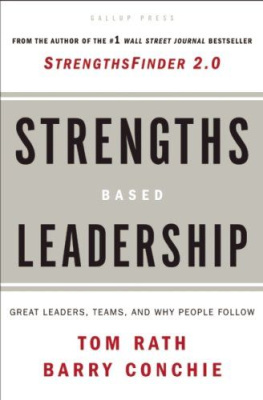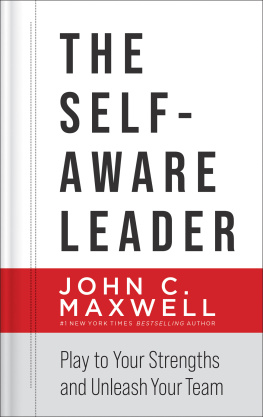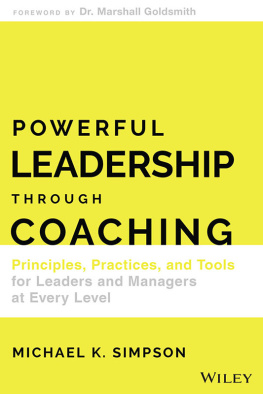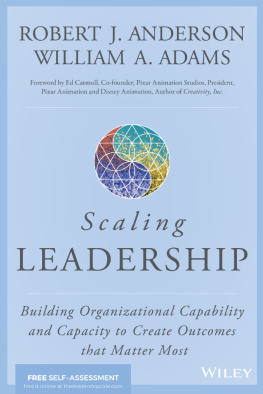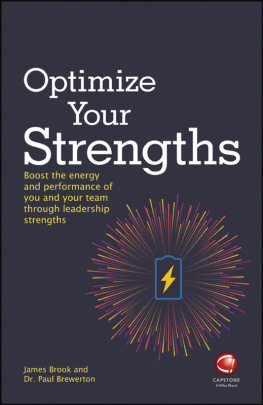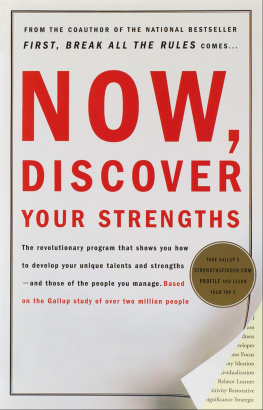Fear
Your Strengths
What You Are Best at
Could Be Your Biggest Problem
Robert E. Kaplan
Robert B. Kaiser

Fear Your Strengths
Copyright 2013 by Robert E. Kaplan and Robert B. Kaiser
All rights reserved. No part of this publication may be reproduced, distributed, or transmitted in any form or by any means, including photocopying, recording, or other electronic or mechanical methods, without the prior written permission of the publisher, except in the case of brief quotations embodied in critical reviews and certain other noncommercial uses permitted by copyright law. For permission requests, write to the publisher, addressed Attention: Permissions Coordinator, at the address below.

| Berrett-Koehler Publishers, Inc.
235 Montgomery Street, Suite 650
San Francisco, California 94104-2916
Tel: (415) 288-0260, Fax: (415) 362-2512
www.bkconnection.com |
Ordering information for print editions
Quantity sales. Special discounts are available on quantity purchases by corporations, associations, and others. For details, contact the Special Sales Department at the Berrett-Koehler address above.
Individual sales. Berrett-Koehler publications are available through most bookstores. They can also be ordered directly from Berrett-Koehler: Tel: (800) 929-2929; Fax: (802) 864-7626; www.bkconnection.com
Orders for college textbook/course adoption use. Please contact Berrett-Koehler: Tel: (800) 929-2929; Fax: (802) 864-7626.
Orders by U.S. trade bookstores and wholesalers. Please contact Ingram Publisher Services, Tel: (800) 509-4887; Fax: (800) 838-1149; E-mail: customer.service@ingrampublisherservices.com; or visit www.ingrampublisherservices.com/ Ordering for details about electronic ordering.
Berrett-Koehler and the BK logo are registered trademarks of Berrett-Koehler Publishers, Inc.
First Edition
Hardcover print edition ISBN 978-1-60994-904-4
PDF e-book ISBN 978-1-60994-905-1
IDPF e-book ISBN 978-1-60994-906-8
2013-1
Interior design and project management: Dovetail Publishing Services
Cover design and production: Nancy Austin
Introduction
THIS BOOK IS THE CULMINATION of the surprising epiphanies and serendipitous insights we have garnered over a lifetime of working with senior leaders, including the CEOs of major corporations, to help them increase their effectiveness. We did not set out to discover what the leadership field has overlooked, but over the years, as we helped these leaders look in the mirror, each little revelation was like a curtain lifting on a neglected part of the drama of leadership. Most of what we have observed is in plain view yet its significance has been missed or it hasnt been put into practice.
Fifteen years ago, a routine executive assessment provided us with just such a seminal moment. We were working with an executive whose 360-degree evaluation characterized him, as one coworker had put it, as an elemental force in nature. Yet his effectiveness as a leader was less than optimal. Look, we offered, you are clearly a force to be reckoned with. Then we took it a step further. The problem is that at times youre overly forceful. There it was. In a way we had never quite realized or articulated before, we acknowledged that too much strength can be a weakness. It dawned on us that doing too much of something was as much of a problem as doing too little of it.
Put differently, your strengths can work against you. Many leaders know this on some intuitive level, but they tend not to accept it in practice. Its not even in most managers vocabulary. Mainly, they think of leadership development as working on their weaknesses. No wonder. The tools used to assess managers are not equipped to pick up on strengths overplayed. In performance appraisals, managers are typically rated as not meeting expectations, meeting expectations, or exceeding expectations. In coworker feedback questionnaires, popularly known as 360s, managers are typically rated as ineffective, effective, or very effective. Nowhere in most assessments is there language or diagnostics that can reveal when someone is overdoing itwhen more is not better.
The lack of attention paid to strengths overplayed has persisted despite the glut of booksmost notably, Marcus Buckingham and Donald Cliftons Now, Discover Your Strengthsexhorting managers to focus on their strengths. Remarkably, in their enthusiasm to accentuate the positive, Buckingham and other strengths advocates fail to point out to their managerial audience the ever-present danger of taking their strengths too far.
In our consulting work, we have increasingly focused on making leaders aware of that danger and enabling the important developmental work necessary to mitigate it. We have enjoyed enviable firsthand exposure to senior leaders, conducted thousands of assessments of individual executives, and collected reams of data. We have put our thinking into practice in the form of an assessment tool, the Leadership Versatility Index (LVI, US Patent No. 7,121,830), a coworker-feedback questionnaire (360) that we designed expressly to assess for strengths overplayed. It has in turn served to further refine our thinking.
Our statistical findings as well as our practical experience form the basis of this book. We regularly illustrate our insights with case studies of executives with whom we have worked closely and extensively. To guard the executives anonymity, the protagonist of each case is actually a composite and real names are not used. But the anecdotes, experiences, and voices we describe are unfailingly real, as are the problems we identified and the solutions that were implemented.
Among our most surprising findings has been that leaders often have a hard time acknowledging their strengths in the first place. Once, when preparing for a feedback session, we were startled to see that the executive was so highly rated that there seemed to be practically nothing wrong with his leadership. Weve got nothing to work with, we thought. It was unnerving. It turned out, however, that there was plenty of ammunition in the positive feedback. This individual underestimated his assets and, as a result, sometimes overcompensated, making him less effective than he might have been.
Gifted leaders, we have found, are often the last ones to acknowledge their gifts, even when they have ample evidence and feedback that attests to it. The practical fact is that the only way to manage your strengths is to accept them. If you literally dont know your own strength, you have no way to calibrate or modulate it. In a relentless effort to be better, you have no way of knowing if you are going too far. One of the main missions of this book is to help you come to grips with your strengths and make full use of them without overdoing it.
We have also found that, for most executives, waking up to the potential dangers inherent in their strengths can be a vertigo-inducing shock. As one senior leader admitted, The idea is unsettling. Its chilling. I really mean that. When leaders are faced with the prospect that the very intensity that fueled their rise to the top can be smothering their coworkers and sabotaging their effectiveness, they are often panic-stricken at the thought of needing to ease up. Im afraid Ill lose my edge, is what we often hear, a reaction that is natural but misguided. In what may be the cruelest of ironies, overplayed strengths are often at the root of career failure. Analyses of derailed leaders time and again point to the excessive reliance on qualities that were key to past success but less relevant to the current role. We have learned that to stop overplaying a strength does not mean, as many leaders fear, to stop using it. It means using the strength more selectively. As another hyperintense executive finally realized, I dont have to give up my fast ball. I just dont have to throw it all the time.




